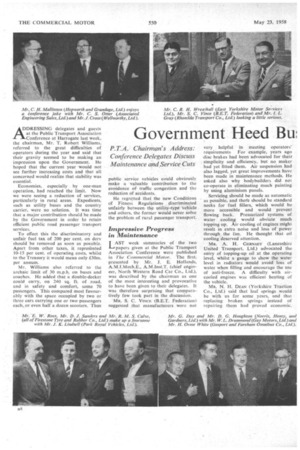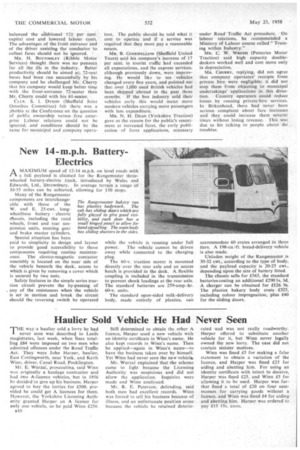Government Heed BIT Operators' Problems
Page 42

Page 43

Page 44

If you've noticed an error in this article please click here to report it so we can fix it.
ADDRESSING delegates and guests at the Public Transport Association . Conference at Harrogate last week, the chairman, Mr. T. Robert Williams, referred to the great difficulties of operators during the year and said that their gravity seemed to be making an impression upon the Government. He hoped that the current year would not see further increasing costs and that all concerned would realize that stability was essential.
Economies, especially by one-man operation, had reached the limit. Now we were seeing a reduction of services, particularly in rural areas. Expedients, such as utility buses and the country carrier, were no solution. It was time that a major contribution should be made by the Government in order to retain efficient public road passenger transport services.
To effect this the discriminatory and unfair fuel tax of 200 per cent. on dery should be removed as soon as possible. Apart from other taxes. it repres'ented 10-15 per cent, of operating costs, whilst to the Treasury it would mean only ±,30m. per annum. Mr. Williams also referred to the archaic limit of 30 m.p.h. on buses and coaches. He added that a double-decker could carry, on 240 sq. ft. of road, and in safety and comfort, some 70 passengers. This compared most favourably with the space occupied by two or three cars carrying one or two passengers each, or even half a dozen scooters. Thus
public service vehicles could obviously make a valuable contribution to the avoidance of traffic congestion and the reduction of accidents.
He regretted that the new Conditions of Fitness Regulations discriminated unfairly between the utility-type vehicle and others, the fc3rrner would never solve the problem of rural passenger transport.
Impressive Progress in Maintenance
I AST week summaries of the two 1—ipapers given at the Public Transport Association Conference were published in The Commercial Motor. The first. presented by Mr. J. E. Hollands, A.M.I.Mech.E., A.M.Inst.T. (chief eagineer, North Western Road Car Co., Ltd.), was described by the chairman as one of the most interesting and provocative to have been given to their delegates. It was therefore surprising that comparatively few took part in the discussion. MR. S. C. VINCE (B.E.T. Federation) suggested that manufacturers were not very helpful in meeting operators' requirements For example, years ago disc brakes had been advocated for their simplicity and efficiency, but no maker had yet fitted them. Air suspension had also lagged, yet great improvements have been made in maintenance methods. He asked also why bodybuilders did not co-operate in eliminating much painting by using aluminium panels. Servicing should be made as automatic as possible, and there should be standard necks for fuel fillers, which would be more accessible and would prevent flowing back. Pressurized systems of water cooling would obviate much topping up. Air cooling of engines might result in extra noise and loss of power through the fan. He thought that oil cooling deserved attention. MR. A. H. GERNAEY (Lancashire United Transport, Ltd.) advocated the entry of topping-up oil at the operating level, whilst a gauge to show the water level_ in radiators would avoid loss of water when filling and encourage the use of anti-freeze. A difficulty with aircooled engines was efficient heating of the vehicle.
MR. N. H. DEAN (Yorkshire Traction Co„ Ltd.) said that leaf springs would be with us for some .years, and that replacing broken springs instead of repairing them had proved economic,
saving Yorkshire Traction £1,400 in 1957, as well as much labour.
MR. R. LE FEVRE (Halifax Joint Omnibus Committee) agreed with Mr. Dean regarding spring replacements and did these at at each 100,000-mile dock, but was doubtful as to the value of automatic lubricators for vehicles returning home nightly. They were not all trouble free.
MR. H. ORME WHITE (Gosport and Fareham Omnibus Co., Ltd.) suggested that he was the only British operator with an air-cooled engine in a bus which would soon be in regular service. The engine was quieter and lighter than a water-cooled type and two more passengers could be carried.
MR. F. G. PARNELL (Automotive Products Co., Ltd.) suggested that it was one thing for a maker to test an item experimentally and another to popularize it with a ethical industry.
MR. J. L. BOWLEY (A.E.C., Ltd.) referred to the great amount of work on air-cooled engines. As regards air suspension, the leaf spring performed several functions, whereas air suspensions were complicated in catering for location and torque reaction.
MR. R. S. CROUCH (Transport Vehicles (Daimler), Ltd.) said the disadvantages of air-cooled engines were noise and power absorption by the fan. More simple systems of suspension than by air deserved attention.
MR. W. M. LITTLE (Edinburgh Corporation Transport) regretted the tendency towards "gadgetry."
MR. HOLLANDS, replying, said that goodwill and publicity must be considered before eliminating painting. He thought there was little difference in the noise between air and water-cooled engines, nor was much power absorbed by the fan. Air suspension had many advantages, including constant height.
How to Obviate Service Reductions
THE paper, "The Changing Scene," by Mr. G. A. Cherry, A.M.I.Mech.E., A.M.lnst.T. (general manager, Birken
head) had also proved to be highly controversial, whilst it covered a wide field concerning both municipal and company operation. It elicited an animated discussion.
MR. D. M. SINCLAIR (B.M.M.0.) said that whereas wartime and immediate postwar trends had produced an expansion of services, contraction was necessary to suit present times. Some services would be cut without harm to the public, but others had to be expanded. In pruning, revenue exceeding saving in costs should not be driven away. Nationalization was not a cure for difficulties in the industry, and subsidy was required only in the form of relief from the 200 per cent. fuel tax which only road users paid.
The revenue from private hire was negligible, he said, in relation to stagecarriage operation. It was important to ensure that there should be no lack of confidence in vehicle condition and reliability, if they were to retain and attract more passengers.
ALD. J. H. WHITAKER, J.P. (Todmorden), thought a subsidy could be justified in some circumstances and should not be ruled out in respect of any industry. Something was to be said for the principle that those who earned high rewards should pay high wages to the people they employed.
MB. T. P. O'DoNNELL (Ashton-underLyme) did not think there was much difference between contvol by a municipal undertaking and by a company: both shareholders and ratepayers expected a return on investment. On maintenance costs, he felt that excess labour should be carefully considered in relation to the ultimate life of the vehicle.
MR. T. G. DAVIES (Western Welsh) had found no way out of the difficulties which existed in rural. areas except by wholesale cuts. Removal of the fuel tax would be a belated act of justice rather
than a subsidy. His company had lost • traffic at off-peak periods, but if they lost a little peak traffic they could probably reduce costs to compensate for this. Nationalization was not in the interests • of the country and was demoralizing to any live manager.
MR. R. C. MooliE (Sheffield Joint Omnibus Committee) said that reducing his peak hour flat from 400 vehicles to 300, by using 30-ft. double-deckers, balanced the additional 12-1 per cent. capital cost and lowered labour costs. The advantages of the front entrance and of the driver assisting the conductor to collect fares should not be ignored.
MR. H. BOITOMLEY (Ribble Motor Services) thought there was no panacea for all the ills in the industry. Better productivity should be aimed at; 72-seat buses had been run successfully by his company and he challengedMr. Cherry that his company would keep better time with the front-entrance 72-seater than Mr. Cherry could with his 61-seater.
Cwt. S. I. DYSON (Sheffield Joint Omnibus Committee) felt there was a phobia at the Conference on the question of public ownership versus free enterprise Labour relations could not be ignored, and conditions. should be the same for municipal and .company. opera tors. The public should be told what it cost to operate and if a service was required that they must pay a reasonable return.
MR. B. GOODFELLOW (Sheffield United Tours) said his company's increase of 17 per cent. in tourist traffic bad exceeded all expectations, and the express services. although previously down, were improving. He would like to see vehicles changed every five years, and pointed out that over 1,000 used British vehicles bad been shipped abroad in the past three months, If the bus industry sold their vehicles early this would mean more modern vehicles carrying more passengers with less expenditure.
MR. N. H. DEAN (Yorkshire Traction) gave as the reason for the public's resentment at increased fares, the early publication of fares applications, necessary under Road Traffic Act procedure. On labour relations, be recommended a Ministry of Labour course called Training within Industry."
MR. C. W. WROTH (Potteries Motor Traction) said high capacity doubledeckers worked well and cost more only in depreciation. •
MR. CHERRY, replying, did not agree that company operators' receipts from private hire were negligible; it did not stop them from objecting to municipal undertakings' applications in this direc
tion. Country operators could reduce losses by running private-hire services. In Birkenhead, there had never been serious complaint about fare increases and they could increase them several times without losing revenue. This was due to his talking to people about the troubles.
























































































